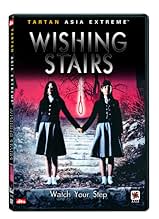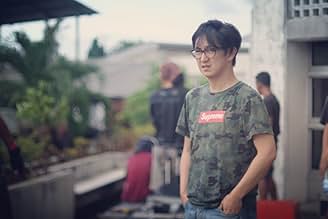Yun Jae-yeon, the first woman to direct a movie of the Yeogo Goedam series, faced a big challenge when making Wishing Stairs. It was Yun's debut, and the two leading actresses, Song Ji-hyo and Park Han-byeol, were newcomers at that time as well. Also, Yun had to meet high expectations because Wishing Stair's predecessors, Whispering Corridors and Memento Mori, had been very successful.
Just like all of the Yeogo Goedam movies, Wishing Stairs has a closed story of its own but plays with the same themes. Again, it takes place at a girls' school, this time a school of arts. There, the main characters, Yun Jin-seong (Song) and Kim Sohee (Park), are studying ballet. They are close friends, but their friendship gets challenged when they both enter a contest for a place to study at a Russian ballet faculty. Yun Jin-seong envies her more talented friend. She works hard but just gets scolded by the teacher, whereas Kim Sohee impresses everybody with her effortless skill; she looks like the sure winner of the contest. Yun's jealousy grows till the point that she even seeks supernatural help: Campus legend has it that there is a stair case on the campus which grants a wish when you reach its last step. But as Yun climbs the stairs, the viewer already knows that this is a bad idea. For folklore tells that wishes granted by a supernatural force often come with undesirable side effects, and Wishing Stairs confirms this.
Like the previous Yeogo Goedam films, Wishing Stairs isn't a real horror movie. The supernatural serves as a vehicle to accelerate a worldly tragedy. So the movie is less about horror and more about people feeling trapped because they are unable to become the persons they want to be. This idea is stressed by the third main character, Eom. Eom is an overweight outsider, and if the other students notice her at all, it's usually just to make fun of her. She tries to escape her misery by idolizing Kim Sohee, dreaming of being her friend or perhaps even being her.
However, it is also Eom (Jo An) where direction wasn't flawless. Unlike her character, Jo happens to be pretty and slim, so she was put in a fat-suit. The problem with that approach is that viewers always notice fat-suits, no matter how well they are made. This might not be a problem in comedies, but in this drama it is a distraction. Also, Jo's performance is sometimes at the border of slapstick, which doesn't do her tragic character justice.
Another distraction was the use of an incoherent flashback. It seems an obligation for Yeogo Goedam movies to employ flashbacks to reveal dark secrets of the past, so Wishing Stairs has one flashback as well. Without spoiling too much, it's about an act of sabotage. However, that small part of the plot doesn't roll out plausibly. It causes more confusion than insight and should have been deleted entirely.
But the strengths of Wishing Stairs outweigh its flaws. The acting of Song and Park is great. The movie has a high production value. And like its predecessors, it has a certain charm and unique mix of drama and horror to it. It is a tragedy of universal nature, so viewers can relate to it even if they don't happen to be Korean teenage girls (as is the case with this old bloke). Wishing Stairs is a worthy entry in the series, which makes director Yun's debut a real accomplishment.

























